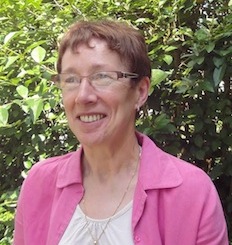The 2013 Felix Klein Award

It is with great pleasure that the ICMI Awards Committee hereby announces that the Felix Klein Medal for 2013 is given to Michèle Artigue, Emeritus Professor, Université Paris Diderot - Paris 7, France, in recognition of her more than thirty years of sustained, consistent, and outstanding lifetime achievements in mathematics education research and development. Michèle Artigue’s research, which was initially in the area of mathematics, progressively moved toward mathematics education during the mid-to-late 1970s. She has been a leading figure in developing and strengthening new directions of research inquiry in areas as diverse as advanced mathematical thinking, the role of technological tools in the teaching and learning of mathematics, institutional considerations in the professional development of teachers, the articulation of didactical theory and methodology, and the networking of theoretical frameworks in mathematics education research. Michèle Artigue’s theoretical contributions to the instrumental approach to tool use and her elaboration of the methodological tool of didactic engineering have had a significant impact and are but two examples of the way in which her work has advanced the field’s collective expertise. Her research is internationally acclaimed with more than 100 groundbreaking articles and books published nationally and internationally, and with no fewer than 40 invited lectures outside France within the past five years alone. A seminal characteristic of Michèle Artigue’s research is that it is always supported by deep mathematical and epistemological reflection. This reflective orientation, combined with her remarkable ability to build bridges between various issues, to identify fruitful directions for research, to clarify and discuss different approaches, and ultimately to enrich theoretical frameworks, make her contributions to the field of mathematics education research extraordinary in both their scope and coherence.
Michèle Artigue’s distinguished scholarly work is matched by a record of outstanding service to the international mathematics education community. In addition to the strong leadership she has demonstrated within the International Commission on Mathematical Instruction (ICMI), she has played a central role in ICMI’s program of international cooperation, the Developing Countries Strategic Group. She has also built relationships with UNESCO for both the International Mathematical Union and ICMI, which have given rise to her authoring the document “Challenges in Basic Mathematics Education”, published in several languages by UNESCO, and serving as ICMI liaison officer for the development and launching of the Capacity and Networking Programme. Her international cooperation activity beyond ICMI has ranged from advising the European projects Fibonacci and PRIMAS to collaborating in program development with researchers in Spain, Brazil, Colombia, and Argentina. At the national level, Michèle Artigue has been active in the Institut National de Recherche Pédagogique, in the French Commission for the Teaching of Mathematics (a regional ICMI sub-commission), and within her own university. Another component of Michèle Artigue’s service to the international community has been her editorial work over several years for the International Journal of Computers for Mathematical Learning, as well as her current co-editorship of the Encyclopedia of Mathematics Education, and her participation in the editorial boards of several prestigious research journals.
Michèle Artigue obtained her Ph.D. in mathematical logic in 1972 from the Université Paris 7. This was followed by a Doctorat d’État ès Sciences in 1984 and the Habilitation à Diriger les Recherches in 1987 from the Université Paris 7. During the years 1970-1991, she was Lecturer and then Maître de Conférences at the Université Paris 7, where she taught mathematics to undergraduate students. In 1991, she was named Professor of the IUFM (University Institute for Teacher Training) at Reims, where she remained until 1999, in charge of the training of future secondary school mathematics teachers. In 1999, she returned to the mathematics department of the Université Paris Diderot - Paris 7, as Professor and also Head of the Institut de Recherche sur l’Enseignement des Mathématiques. In September 2010, she was named Emeritus Professor.
When Michèle Artigue joined the newly created Université Paris 7, she was one of the first members of its Institute for Research on Mathematics Teaching (IREM). There she became interested in the developing theory of didactical situations and, for the thesis of her Doctorat d’État, conducted the first study in didactic engineering in an “ordinary” school. She found that the classroom as a dynamical system defied the then-current implicit models of reproducibility of didactical situations and thus was kindled her passion for theory building. When her research turned toward the integration of digital tools into the learning of upper secondary and university level mathematics, the need for theoretical foundations in this area was soon apparent to her. She and her research team sought to generate a framework that would avoid the traditional “technical-conceptual cut.” Drawing on Chevallard’s anthropological theory of the didactic and Rabardel’s cognitive ergonomic approach, the framework of the instrumental approach to tool use emerged. Further theoretical development was to occur when she collaborated on the two successive European projects, TELMA and ReMath. One of her early initiatives within the ReMath project was the formulation of an integrative theoretical frame, using for the first time the language of networking of theories. This construct is one that she has been continuing to develop both theoretically and methodologically with a group of CERME researchers.
Some of Michèle Artigue’s most highly-cited publications include: the now-classic article on the use of digital tools in mathematics education, Learning mathematics in a CAS environment: the genesis of a reflection about instrumentation and the dialectics between technical and conceptual work(2002); her seminal article on didactic engineering, Ingénierie didactique (1989); the article on epistemology and didactics, Epistémologie et didactique (1990); and her chapter on university-level teaching and learning, What can we learn from educational research at the university level? (2001). In addition to her published contributions, Michèle Artigue has supervised more than two dozen Ph.D.s and Habilitations à diriger les recherches, and has mentored several young researchers, especially from developing countries.
In summary, Michèle Artigue is an eminently worthy recipient of the Felix Klein Medal for 2013.